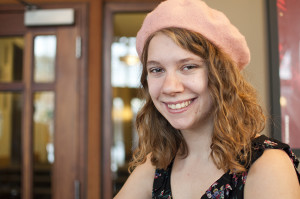A fast, a feast, a favor
MSA’s Fast-a-thon to help Syrian Orphans
October 11, 2013
Last Saturday, the Case Western Reserve University community came together to support volunteer efforts in Syria at the Muslim Student Association’s (MSA) annual Fast-a-thon fundraiser.
The five dollar tickets got students, family and visitors alike into the Thwing ballroom for a three-course meal. While tickets were sold throughout the week at Nord, MSA representatives encouraged attendees to fast before the event in order to learn more about their culture.
Though fasting wasn’t required, it seemed evident that a good amount of people had not eaten, based off of heavy traffic surrounding the food. Both students and family members were in attendance, with infants bobbing in mothers’ arms and children weaving between the tables. Seeing this kind of variety in the crowd made the message of displaced children even more real.
Juheena Irshad, the MSA public relations chair, thought that the night was a great success. “We were almost to full capacity 11 minutes into the event and ran out of all the food, which was amazing,” she said.
Once the hectic confusion bubbled down within the crowd of attendees near the food tables, an orderly line stretched across the length of the Thwing ballroom.
Appetizers included pita, hummus and samosas, and as the line continued to file forward, a call to prayer was announced. The actual act of praying was optional, but amazingly enough, the entire room hushed respectively until the prayer was done.
Later, when dinner was served, it didn’t take any reminders for people to line up in an orderly fashion. Maybe it was because people weren’t as hungry after the first round of food, or maybe the depth of the night’s purpose had finally dawned on the crowd.
Small fliers depicting statistics about Syrian conflict were spread across each table as slideshows flashed on stage to music. The night quickly transformed from one about food to one about a solemn response to Syrian tragedies.
The event’s profits went directly to Syrian Orphans, an organization which, through volunteer action, brings any donated money directly to children in refugee camps and other Syrians in need.
According to Syrian Orphans, 3.1 million children currently experience violent lifestyles which include supply shortages and destroyed hospitals and schools. The war in Syria affects more than four million children, and that number will likely continue to rise as the conflict continues.
The Syrian conflict’s prevalence was reiterated in speaker Iman Abbas Ahmed’s speech. “[Syria] is reaching pandemic proportions… threatening the very fabric of our society,” said Ahmed. “It’s bigger than we could ever imagine.”
Ahmed, the founder of the first Cleveland mosque and an active foster care parent, has personally experienced many struggles with raising orphans. He compared orphans to a popular line in “Forrest Gump” at one point in his speech:
“Foster children are like a box of chocolates,” he said. “You never know what you’re gonna get.”
His quirky comparison was followed up with some personal descriptions of orphan struggles and the effects of behavioral problems. Ahmed brought the topic into a more college-centered focus when he said, “You should be making some type of impact on children who don’t have the same opportunity as you.”
Irshad’s favorite part of the night was Ahmed’s speech. “His insight into foster care and the need to take care of orphans really seemed to resonate with the crowd,” she said.
Ahmed’s speech was an effective way to punctuate the night, even if it was a bit repetitive. However, his point of helping those in need was clear. Ahmed called everyone in attendance to stand up and take action, posing a simple question to help understand the plight of Syrian children:
“What if it was you?”


